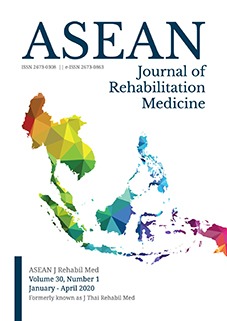Application of ICF Framework for Preparedness of Rehabilitation Services during COVID-19 Outbreak
Keywords:
ICF, COVID-19Abstract
The outbreak of COVID-19 in China which started in December 2019, has globally affected everyone. The daily update on COVID-19 epidemiology shows the numbers of both new and accumulated cases have been increasing in the ASEAN countries. It has been predicted that it might last for a year or two. Therefore, rehabilitation physicians (physiatrists) and professionals in ASEAN countries have to be well-prepared so that we could continue our rehabilitation services safely, efficiently and effectively to our patients.
The ICF framework could be used to guide how rehabilitation services could still be continued during the COVID-19 outbreak. The most important strategy is to prevent our limited numbers of rehabilitation staff from contracting the virus so that their body functions (and mind) are still functional and not spread the virus to our patients. Next, is to think how to adapt the environmental factors to ensure a safe working environment.
The first factor is products and technology. Personal protective equipment (PPE)- masks, gloves and gowns should be available and used wisely, safely and effectively. Many countries do not have surplus supply of PPE to start with and during the COVID-19 outbreak, the PPE are much needed by the frontliners. Technology for communication and education such as use of mobile phone and internet for intra-team and cross-functional team communication should be implemented to lessen face-to-face communication, thus minimizing risk of spreading infection. And equipment used during rehabilitation services should be regularly cleaned according to the recommended guidelines.
The second factor is natural and human-made changes to environment and this concerns indoor air quality. Some treatment areas are in air-conditioned area. If outdoor air quality is not polluted, having treatment in an open-air space is better.
The third factor is support and relationships. As health professionals we have to provide rehabilitation services to patients with impairments and disabilities and at the same time we as well as our immediate family and friends are at risk of contracting or spreading the virus. This may affect support and relationships.
The fourth factor is attitude. Fear of contracting the virus should not prevent us from providing the services. Cognitive behavioral therapy (CBT: minimization of risk, beware of magnification of bias, better safe than sorry, distraction from fake news and social media, fear but not hate, time protection, etc.) might be helpful. We should believe that working with universal precaution and mindfulness could save us. Calm our patients and their family; provide appropriate facts and advise to nurture positive attitude towards isolation, good hand hygiene and social distancing.
The last factor is service, system and policy. National, hospital and department policy should be aligned. Policies should be implemented to minimize new cases, provide adequate medical equipment for prevention and treatment, and continue health services for those in need. There must be clear criteria on how to screen and select of cases that needs rehabilitation treatment and intervention. There is a need to ensure persons who need rehabilitation are not deprived but at the same time making sure that they are not exposed to unnecessary risk of contracting COVID-19. In time of crisis there is always a need to prioritize utilization of resources.
In this first issue of ASEAN J Rehabil Med 2020, there is a special article of recommendations for medical rehabilitation services and management during COVID-19 outbreak. I hope this article will be beneficial to all colleagues in ASEAN countries.






